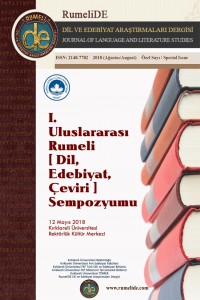Abstract
Subjectivity/intervention of the translator has
long been problematized by translation scholars at the theoretical level. Yet
the translator’s authorial right is still far from gaining widespread
recognition. The translator is still perceived as an invisible messenger while the
author is perceived as the sole owner of meaning, and the acknowledgement of
the inescapability/inevitability of the translator’s interpretation is
obstructed by the notion of fidelity which continues to dominate the discourse
on translation. Through the Lacanian concept of desire, this paper aims to
re-think the faithfulness-centered discourse on translation which dignifies the
original and the author as the owner of the original and denies the
translator’s authorial right. The paper puts forward that the
faithfulness-centered translation discourse that maintains the hierarchical
relationship constructed between author/original and translator/translation in
favor of the former is a reflection of a relationship of love and desire with
the author/original, a kind of ontological relationship as well as the belief
in the stability of meaning. The said discourse can be interpreted as a
manifestation of the pain stemming from the unsatisfiable desire of the subject
to complete himself/herself, to recover the loss while the subject reads
himself/herself as he/she reads the original. The paper suggests that what
underlies the survival of the concept of faithfulness as the most effective
tool of the translation discourse that expects faithfulness to the original and
labels translation activity as treason in the opposite case is a kind of
ontological concern and that faithfulness to the original as an object of
desire can be thought of as the fantasy of the reader/critic-subject desiring
to complete himself/herself.
References
- Arrojo, R. (1997). The “Death” of the Author and the Limits of the Translator’s Visibility. Translation as Intercultural Communication: Selected papers from the EST Congress, Prague 1995. Mary Snell-Hornby, Zuzana Jettmarová ve Klaus Kaindl (ed.). Amsterdam/Philadelphia: John Benjamins, s. 21-32. Arrojo, R. (2002). Writing, Interpreting and the Control of Meaning. Edwin Gentzler ve Maria Tymoczko (ed.), Translation and Power. Amherst: University of Massachusetts Press, s. 63-79 Arrojo, R. (2004). Translation, Transference, and the Attraction to Otherness: Borges, Menard, Whitman. Diacritics, 34( ¾), Literary into Cultural Translation (Autumn - Winter), s. 31-53. Demandante, D. (2014) Lacanian Perspectives on Love. Kritike, 8(1), s. 102-118 Derrida, J. (1999). Japon Bir Dosta Mektup. Toplumbilim. Ağustos, s. 186-187. Kathleen, D. (2001). Deconstruction and Translation, (Translation Theories Explained Vol. 8, ed. Anthony Pym). Manchester, UK & Northampton, MA: St. Jerome Publishing, Mansfield, N. (2006). Öznellik, Freud’dan Haraway’e Kendilik Kuramları. H Çetinkaya, R. Durmaz (çev.). İzmir: ARA-lık. Merrill, Trevor Cribben (2014). The Book of Imitation and Desire: Reading Milan Kundera with Rene Girard. Bloomsbury Academic, s. 173. Öner, S. (2013). Çeviri Yoluyla Kanun Yapmak: 1858 Tarihli Osmanlı Ceza Kanunu’nun 1810 Tarihli Fransız Ceza Kanunu’ndan Çevrilmesi (Yayımlanmamış Doktora Tezi). Yıldız Teknik Üniversitesi, İstanbul, Türkiye. Özmen, E. (2002). Lacan, Ayna Evresi ve Marx. Birikim, Nisan. http://www.birikimdergisi.com/birikim-yazi/5175/lacan-ayna-evresi-ve-marx#.Wu3GlYiFPIV. Sarup, M. (1995). Post-Yapısalcılık ve Postmodernizm. A. Bâki Güçlü (çev.). Ankara: Ark. Serrano Tristán, M. (2014) Psychoanalysis and Translation: A Literature Review. Letras, 2(56), s. 55-88. Turan, M. O. (2013). Kuyu Filmindeki Arzu Kavramının Lacancı Psikanalitik Yaklaşım Çerçevesinde Çözümlenmesi. Selçuk İletişim, 7(4), s. 169-188.
Abstract
Çevirmenin yorumlayan bir özne olduğu düşüncesi
çeviribilimciler tarafından kuramsal düzeyde uzun süredir tartışılmakta olsa da
çevirmenin yazarlık hakkı yaygın kabul görmekten hala uzaktır. Çevirmen,
anlamın yegâne sahibi olduğu düşünülen yazar karşısında görünmez bir elçi
konumunda bulunmaktan kurtulamamakta, çevirmenin öznelliği, bu öznelliğin
kaçınılmazlığı ve önlenemezliği düşüncesinin yaygınlaşması, çeviri
tartışmalarına damga vuran sadakat kavramı tarafından engellenmektedir. Bu
makale çevirmene yazarlık hakkı tanımayan, özgünü ve özgünün sahibi olarak
yazarı yücelten sadakat-merkezli çeviri söylemini Lacan’ın arzu kavramı ile
yeniden düşünmeyi amaçlamaktadır. Makalede, yazar/özgün ile çevirmen/çeviri
arasında, ilkinin lehine işlemek üzere kurgulanmış olan hiyerarşik ilişkiyi
sürdüren, sadakat-merkezli çeviri söyleminin, anlamın sabitlenebilirliği inancı
kadar, yazar/özgün ile girilen bir aşk ve arzu ilişkisini, bir tür varoluşsal
ilişkiyi de yansıttığı ileri sürülmektedir. Söz konusu söylem, özgünü okurken
kendini okuyan/okumayı isteyen, kendini tamamlamayı, eksikliğini gidermeyi
arzulayan öznenin asla giderilemeyecek arzusunun sancısının yansıması olarak
görülebilir. Çevirmenden, özgüne sadık kalmasını bekleyen, aksi takdirde çeviri
eylemini ihanet olarak kodlayan söylemin en etkili aracı olarak sadakat
kavramının varlığını korumaya devam etmesinin altında bir tür varoluş
kaygısının yattığını öne süren makalede, bir arzu nesnesi olarak özgüne
sadakat, kendini tamamlama arzusu içinde olan okur/eleştirmen-öznenin fantezisi
olarak düşünülmektedir.
References
- Arrojo, R. (1997). The “Death” of the Author and the Limits of the Translator’s Visibility. Translation as Intercultural Communication: Selected papers from the EST Congress, Prague 1995. Mary Snell-Hornby, Zuzana Jettmarová ve Klaus Kaindl (ed.). Amsterdam/Philadelphia: John Benjamins, s. 21-32. Arrojo, R. (2002). Writing, Interpreting and the Control of Meaning. Edwin Gentzler ve Maria Tymoczko (ed.), Translation and Power. Amherst: University of Massachusetts Press, s. 63-79 Arrojo, R. (2004). Translation, Transference, and the Attraction to Otherness: Borges, Menard, Whitman. Diacritics, 34( ¾), Literary into Cultural Translation (Autumn - Winter), s. 31-53. Demandante, D. (2014) Lacanian Perspectives on Love. Kritike, 8(1), s. 102-118 Derrida, J. (1999). Japon Bir Dosta Mektup. Toplumbilim. Ağustos, s. 186-187. Kathleen, D. (2001). Deconstruction and Translation, (Translation Theories Explained Vol. 8, ed. Anthony Pym). Manchester, UK & Northampton, MA: St. Jerome Publishing, Mansfield, N. (2006). Öznellik, Freud’dan Haraway’e Kendilik Kuramları. H Çetinkaya, R. Durmaz (çev.). İzmir: ARA-lık. Merrill, Trevor Cribben (2014). The Book of Imitation and Desire: Reading Milan Kundera with Rene Girard. Bloomsbury Academic, s. 173. Öner, S. (2013). Çeviri Yoluyla Kanun Yapmak: 1858 Tarihli Osmanlı Ceza Kanunu’nun 1810 Tarihli Fransız Ceza Kanunu’ndan Çevrilmesi (Yayımlanmamış Doktora Tezi). Yıldız Teknik Üniversitesi, İstanbul, Türkiye. Özmen, E. (2002). Lacan, Ayna Evresi ve Marx. Birikim, Nisan. http://www.birikimdergisi.com/birikim-yazi/5175/lacan-ayna-evresi-ve-marx#.Wu3GlYiFPIV. Sarup, M. (1995). Post-Yapısalcılık ve Postmodernizm. A. Bâki Güçlü (çev.). Ankara: Ark. Serrano Tristán, M. (2014) Psychoanalysis and Translation: A Literature Review. Letras, 2(56), s. 55-88. Turan, M. O. (2013). Kuyu Filmindeki Arzu Kavramının Lacancı Psikanalitik Yaklaşım Çerçevesinde Çözümlenmesi. Selçuk İletişim, 7(4), s. 169-188.
Details
| Primary Language | Turkish |
|---|---|
| Journal Section | Turkish language, culture and literature |
| Authors | |
| Publication Date | August 20, 2018 |
| Published in Issue | Year 2018 - Özel Sayı |


